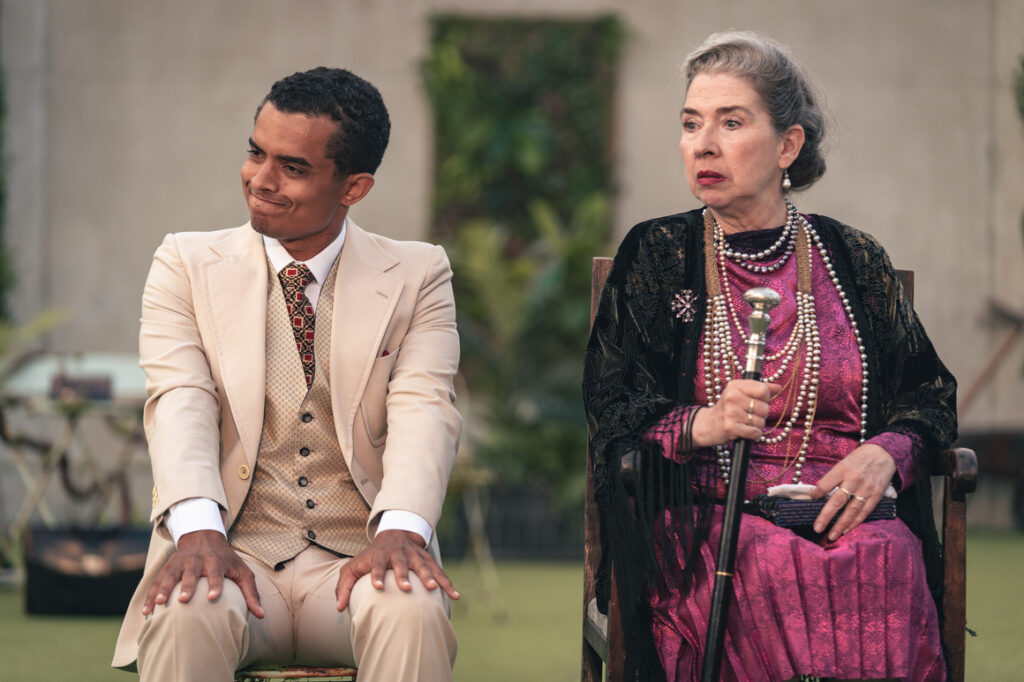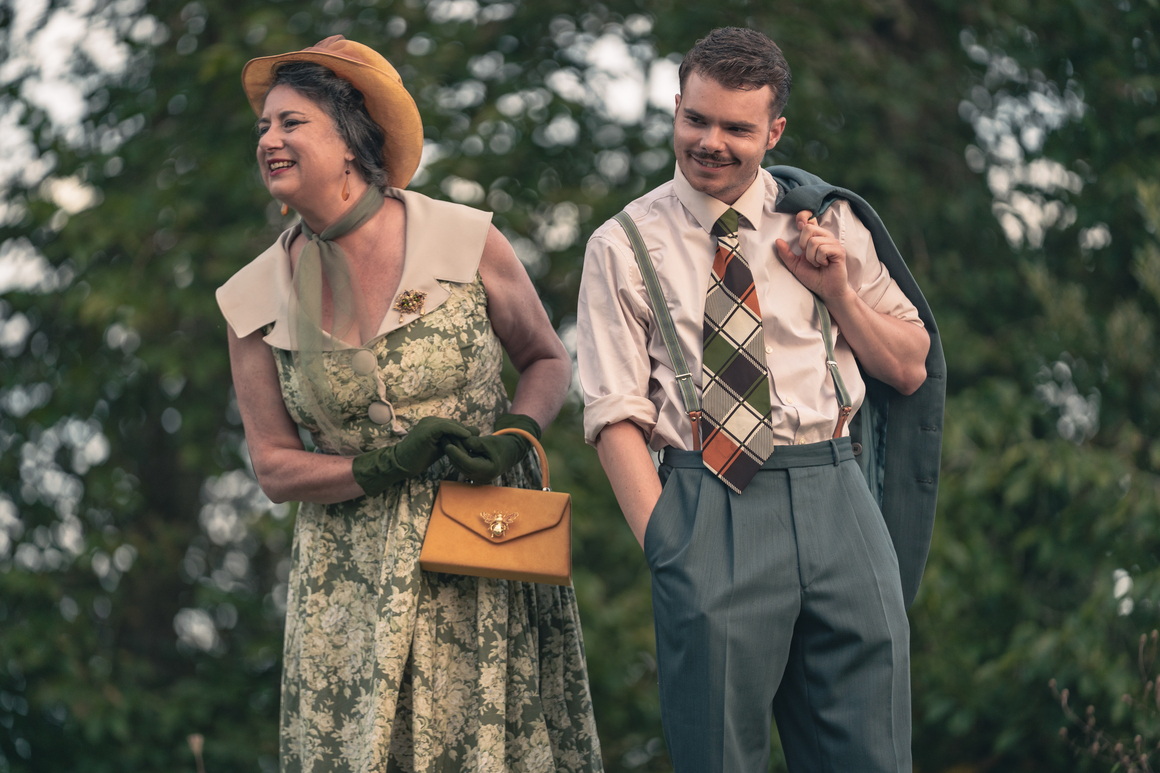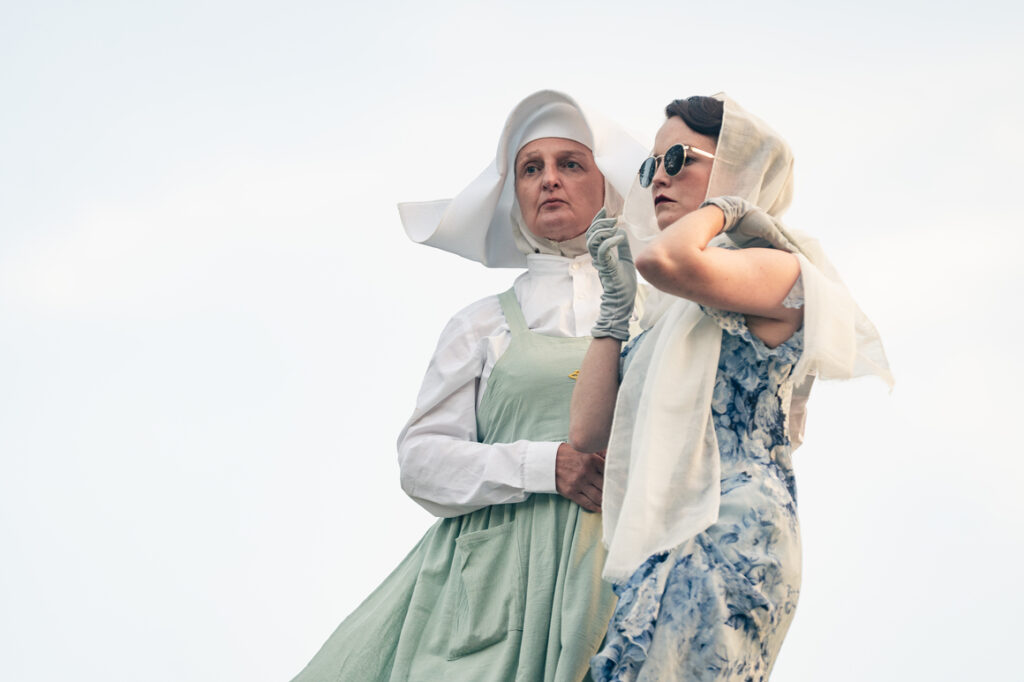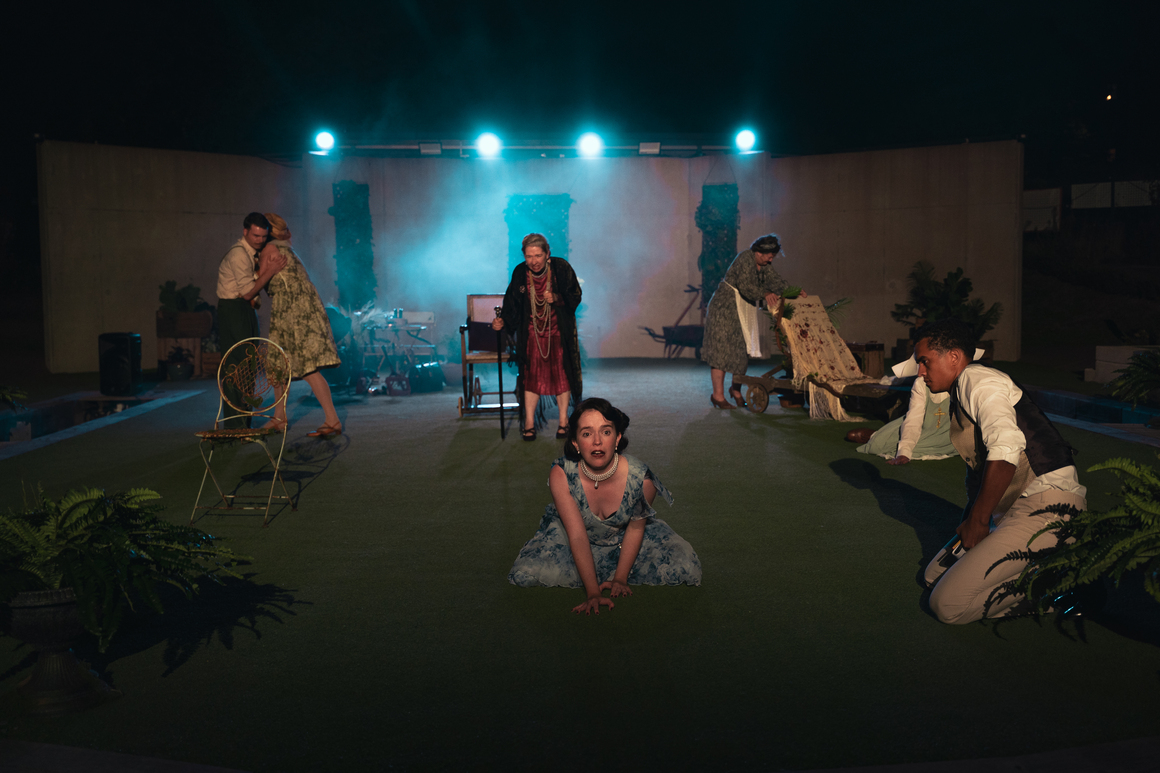Review by Simon Jenner, August 27 2025
★★★★★
Southern Gothic. Specifically Greek Southern Gothic at Brighton Open Air Theatre. How quickly this has become synonymous with the Conor Baum company. Tennessee Williams’ 1957 Suddenly Last Summer is a burning study in aftermath, where the price of telling the truth is annihilation – as complete as that which overtook the person whose truth is being told. It’s directed at BOAT by Conor Baum till August 30.
This is a 90-minute Greek-constructed play with a very different set of Bacchantes lying in wait near the end. There’s echoes too of the revelations in Arthur Miller’s All My Sons. This production hints the white-sky heat suffusing the climactic monologue, in this most poetic, image-studded of all Williams’ plays. This despite a driving downpour every time someone says “semi-tropical”. The whole play, eschewing interiors, is set in the tropical garden. This not only fits the BOAT but heightens the drama’s themes, rendering them claustrophobic as some characters stud the ground or circle the stage slowly. Much use is made of the periphery by characters like satellites.


Oliver Clayton and Sharon Drain. Photo Credit: Sam Cartwright
It’s 1937. Formidable Violet Venable (Sharon Drain) is an old-money tyrant in denial of a slight stroke. Drain’s presence, her shifts in her wheelchair or tottering, her flummoxy outbreaks, inflect the production. Drain does move on occasion and her movement’s always akin to those outbursts. The more vertical she is, the more enraged out of her invalid but basilisk gaze. Flailing hauteur around her Drain verbally pummels her carer Miss Foxhill (Peta Taylor, a beautifully-judged study in flinch and hover, registering her mistress’ nerves on her body) as she seethes at Catherine, a niece by marriage. Venable holds Catherine responsible for the death of her 40-something poet son Sebastian.
Before Catherine arrives, Doctor Cukrowicz (Oliver Clayton) is importuned, not subtly, to deliver the coup de grace in return for research funding. This is to recommend a lobotomy on Catherine. Venable is however equally complicit with what she abhors. What this is has been voiced. It must never be again. Clayton’s Doctor Sugar (translation of the Polish Cukrowicz) demurs.
Before that encounter, we’re treated to Catherine’s mother and brother. George Holly (Jordan Southwell) is a parodic study in self-serving worthlessness. He’s a man so morally blank that his entitlement, in Southwell’s hands, doesn’t drip: it slathers. George is without even the polish usually accorded such people. You never know if the tennis racket he wields is a sportive twitch or club.
Mrs Holly (Deborah Kearne) wants the same thing, is just a little subtler in pursuing it, just a bit more wheedling, more hideous. Kearne simpers superbly through pastels and bows raising her voice to rhyme with the macaws in the sound system. You’d think the awkwardly rhyming mother and son, with their degrees of blatancy was the worst thing. But their approaches to Catherine are more hideous than wheedling to Venable. The pair seethe for her to accept extinction like Death & Co: George with savage dismissal, Kearne with a degree of iciness which finds a different, chilly echo in Catherine. Their dress renders this the more hallucinated. Chully Mullock’s period costumes swim in silk gestures and a crack of linen.
Catherine Holly (Isabella McCarthy Somerville) only arrives with steely, malign Sister Felicity (Jules Craig, a fine study in minor Catholic sadism, realised in the most fantastic seagull-attracting headgear and not a little savage pecking). Clayton’s Cukrowicz immediately decides to effect what Catherine fears – a truth injection. Gradations of persuasion and rapprochement as the two sympathetic protagonists are finally alone are thrilling.
It can’t last, but Catherine will have her hour in court as it were. Clayton’s quietly firm; his relentless Doctor Cukrowicz is both emotionally open and somehow inscrutable. What Cukrowicz stands for slowly emerges.
Clayton’s is a strong, still performance, full of cognitive micro-shifts as a compassionate man adjusts – several times – to several appalling truths at once; and appalling or appalled people, dead and alive. Clayton only steps out of his white suit, as it were, towards the end; where his serum works and he urgently protects Catherine’s truth with strong words and a physically protective arc.

But the latter half of the play is McCarthy-Somerville’s. Memorable above all for Betsy, Wisdom of a Brighton Whore which she took to off-Broadway, here McCarthy-Somerville gives a performance she seems born for: the distressed but lucid Catherine. There’s a spring-coil violence threatened in McCarthy-Somerville’s portrayal though. At any moment you feel she might betray herself into what people think she should be.
McCarthy-Somerville layers a woman already institutionalised for months: frightened, still liable to panic and flight, even sexual displacement: but in the doctor’s hands, a tremulous but resolute truth-teller. It’s a riveting, detailed performance with a vocal register from flailing distress to ice-cold and withdrawn, then sibylline.
Sebastian’s love of beautiful people was predatory, even racist: “Sated” with “the dark-haired ones” he was “famished for blonds”. In 1937 that suggested eugenics. Sebastian was ruthless too: rejecting his mother after her stroke as no longer pleasant to look at or attract men. So his recruiting the hapless Catherine is just prelude to what’s related latterly. Then, having pushed as far as he can in telling comfortless truths about sexuality in 1957, Williams ends with lapidary terseness.
With compositional elements by Stefan Gregory and Hampus Naesilius, Gary Sefton’s sound design with macaws and ominous percussion is a sound design that lowers a well into the eerie, and doesn’t seem grafted. Baum’s set design features unbridled plants, some growing up to reclaim the back walls; cane chairs, sofa, a period wheelchair. Beverley Grover’s lighting is subtle for this venue. It steals on and brightens the violet air.
Conor Baum seems drawn to both Greek tragedy and Southern stories which clamour kinship. With Homestead (adapting Lorca’s The House of Bernarda Alba), then more recently Electra (seen again at BOAT three weeks ago), and here, Baum and his company are carving out a record of distinction. We’re lucky it’s started in the south east. And with such actors a distinctive intensity that often lands happily at BOAT. Outstanding.
Set Construction Lex Pickett, Ethan Michale, Jules Craig, Peta Taylor, Conor Baum. Photo Credit Sam Cartwright
Jules Craig and Isabella McCarthy-Somerville. Photo Credit: Sam Cartwright



